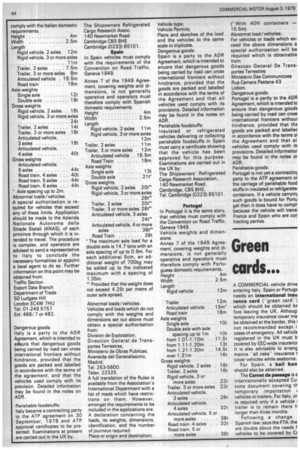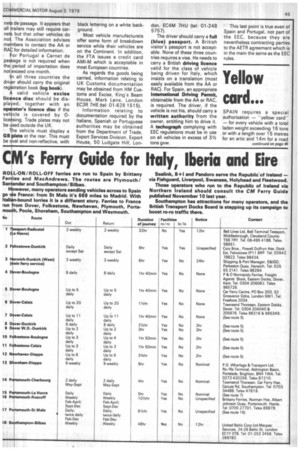Green
Page 46

Page 47

If you've noticed an error in this article please click here to report it so we can fix it.
cards...
A COMMERCIAL vehicle drive entering Italy. Spain or Portuga needs an international insu rance card ("green card") which should be obtained be fore leaving the UK. Althougl temporary insurance cover ma be obtained at the border, this i not recommended except i cases of emergency. All vehicle registered in the UK must b covered by EEC-wide insurance It is also advisable to arrang marine "all risks" insurance t cover vehicles while seaborne, For Spain, a bail bon should also be obtained.
The Carnet de passage is a internationally accepted Cu: toms document covering th temporary importation vehicles or trailers. For Italy, or is required only if a vehicle trailer is to remain there fi longer than three months.
Following a change Spanish law, says the FTA, the are doubts about the needs f vehicles to be covered by Ce nets de passage. It appears that all trailers may still require carnet but that other vehicles do no'. The Association advises me bers to contact the AA or RA for detailed information.
or Portugal a Carnet de pa sage is not required when the period of importation does not exceed one month.
In all three countries the dri er should carry the original reg stration book (log book). valid vehicle excise lic nce disc should be displa ed, together with an o rator's licence disc if the vehicle is covered by 0lice sing. Trade plates may not be sed outside the UK.
he vehicle must display a GB late at the rear. This must be sval and non-reflective, with black lettering on a white background.
Most vehicle manufacturers offer some form of breakdown service while their vehicles are on the Continent. In addition, the ETA issues a credit card AIVII-M which is acceptable in most European countries.
As regards the goods being carried, information relating to UK Customs documentation may be obtained from HM Customs and Excise, King's Beam House, Mark Lane, London EC3R 7HE (tel: 01-626 1515).
Information relating to documentation required by the Italians, Spanish or Portuguese authorities may be obtained from the Department of Trade, Export Services Division, Export House, 50 Ludgate Hill, Lon
don, EC4M 7HU (tel: 01-248 5757).
The driver should carry a full (blue) passport. A British visitor's passport is not acceptable. None of these three countries requires a visa. He needs to carry a British driving licence valid for the class of vehicle being driven for Italy, which insists on a translation (most easily available from the AA or RAC). For Spain, an appropriate International Driving Permit, obtainable from the AA or RAC, is required. The driver, if the vehicle is not his, should carry a written authority from the owner, entitling him to drive it. A tachograph complying with EEC regulations must be in use on all vehicles in excess of 31/2 tons gvw. This last point is true even of Spain and Portugal, not part of the EEC, because they are nevertheless contracting parties to the AETR agreement which is in the main the same as the EEC rules.




































































































